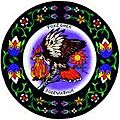Pokagon Band of Potawatomi Indians facts for kids
|
|
|
| Total population | |
|---|---|
| c. 5,660 as of 2019[update] | |
| Regions with significant populations | |
| Michigan & Indiana | |
| Languages | |
| English, Potawatomi | |
| Religion | |
| Christianity Roman Catholic, traditional tribal religion |
The Pokagon Band of Potawatomi Indians (in their own language: Pokégnek Bodéwadmik) is a federally recognized Native American tribe. They speak a language called Potawatomi. Their main home is in southwestern Michigan and northeastern Indiana. The tribe's government offices are in Dowagiac, Michigan. They live on lands across ten counties in this area.
The Pokagon people are descendants of Potawatomi villages. These villages were historically located along the St. Joseph, Paw Paw, and Kalamazoo rivers. These rivers are in what is now southwest Michigan and northern Indiana. In the 1830s, many Native American tribes were forced to move west. This was part of a policy called Indian removal. But the Pokagon were the only Potawatomi band allowed to stay in Michigan. They gained official recognition from the United States government in 1994. Since then, they have built their own self-government.
Contents
The History of the Pokagon Potawatomi
Some people believe the Potawatomi first lived near the Atlantic Ocean. This was at the mouth of the St. Lawrence River. Archaeologists think they moved south from Ontario about 1,000 years ago. Other tribal elders say the Potawatomi started near Lake Michigan. This was at the mouth of the Grand River. Or they began along the St. Joseph River near Mishawaka, Indiana.
Some followers believe that over many centuries, the Potawatomi moved west. They moved with the Ojibwe and Odawa Anishinaabe peoples. This was part of a "Great Migration" to the Great Lakes region. This migration happened about 500–800 years ago.
Treaties and Staying in Michigan
The Pokagon Band of Potawatomi Indians signed 11 treaties with the federal government. A major land agreement was the 1833 Treaty of Chicago. During the Indian removal period, many Potawatomi bands were forced to move west. However, Chief Leopold Pokagon worked hard to keep his band of 280 people in southwestern Michigan. They were the only Potawatomi band who did not have to move west of the Mississippi River.
Regaining Official Recognition
Under the Indian Reorganization Act of 1934, the Pokagon Band wanted to restore their self-government. They asked the Department of the Interior to recognize them as a tribe. But they were denied because of their treaties and laws. After many years of asking, the Pokagon Band finally regained recognition in 1994. This happened through a special law that confirmed their status. Many cities and streets in Michigan now have names from the Potawatomi language.
The Pokagon Today
Casinos and Community Growth
As a federally recognized tribe, the Pokagon Band could develop businesses. In 2007, they opened the Four Winds New Buffalo casino. It is on the Pokagon Reservation in New Buffalo Township, Michigan. The casino follows the Indian Gaming Regulatory Act and an agreement with Michigan. It grew in 2011 because it was very successful. The Chicago Tribune newspaper said that if this casino were in Las Vegas, it would be the second largest.
The casino's rotunda is built like the Potawatomi people's traditional lodges. In 2011, a second casino, Four Winds Hartford, opened in Hartford, Michigan. The tribe opened a third casino, Four Winds Dowagiac, in 2013 in Dowagiac, Michigan. An agreement with Michigan from 2008 limits the band to three casinos in the state. In 2018, the tribe opened Four Winds South Bend in South Bend, Indiana. They believe this casino also follows the rules for gaming.
In February 2021, the Pokagon Band started their online gaming platform. This made them the 11th group to offer online sports betting and casino games in Michigan. The tribe has used money from gaming to build needed housing. They also plan to build a community center. The Pokagon received $2 million from the Department of Housing and Urban Development. This money will help build a community center at their tribal center in Dowagiac.
The building is designed to be very energy efficient. It will use a green roof and thick concrete floors to save energy. It will also have windows facing south to get winter sun and heat. Plus, it will use geothermal systems.
Land and Cultural Connections
In 2018, the Field Museum of Natural History in Chicago included a tribal member on its advisory committee. The museum stands on Pokagon land. This committee helps change the Native North American Hall. The goal is to include the ideas and voices of Native peoples and Indigenous nations.
Language Revitalization Efforts
Fewer elders among the Potawatomi bands speak their language today. However, the Pokagon are part of a program to bring the language back. This program teaches and encourages the use of the Potawatomi language.
 | Laphonza Butler |
 | Daisy Bates |
 | Elizabeth Piper Ensley |


